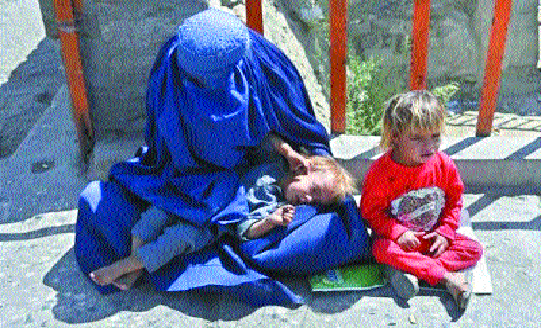Afghanistan teetering on brink of ‘universal poverty’, says UN
| Date :11-Sep-2021 |

Taliban takeover of Afghanistan has put 20 years of steady economic gains at risk, says UN development agency
THE United Nations development agency has said that Afghanistan is teetering on the brink of “universal poverty” which could become a reality in the middle of next year unless urgent efforts are made to bolster local communities and their economies.
It said that the Taliban takeover of Afghanistan has put 20 years of steady economic gains at risk.
The UN Development Programme outlined four scenarios for Afghanistan following the Taliban’s August 15 assumption of power that predict the country’s GDP will decline between 3.6% and 13.2% in the next fiscal year starting in June 2022, depending on the intensity of the crisis and how much the world engages with the Taliban.
That is in sharp contrast to the expected 4% growth in GDP before the fall of the Government.
“Afghanistan pretty much faces universal poverty by the middle of next year,” Kanni Wignaraja, UNDP’s Asia-Pacific Director, told a news conference on Thursday while launching its 28-page assessment. “That’s where we’re heading -- it’s 97-98% (poverty rate) no matter how you work these projections.”
Currently, the poverty rate is 72% and Wignaraja pointed to many development gains after the Taliban were ousted
from power in 2001: Per capita income more than doubled in the last 20 years, life expectancy at birth was extended by about nine years, the number of years of schooling rose from six to 10, “and we got women into university.”
Important that Taliban adheres to commitment against terrorism: India
By Yoshita Singh
TERMING the situation in Afghanistan as “very fragile”, India has said, it is important that the Taliban adheres to its commitment not to allow the use of the Afghan soil for terrorism, including from terror groups designated under Security Council resolution 1267 that lists Pakistan-based outfits Lashkar-e-Toiba and Jaish-e-Mohammed.
India’s Permanent Representative to the UN Ambassador T S Tirumurti said at the UN Security Council Debate on Afghanistan on Thursday that as Afghanistan’s neighbour, India was privileged to preside over the adoption of a substantial and forward-looking product of the Council during its presidency of the 15-nation UN body last month.
The resolution on Afghanistan “took into account some of our collective concerns, in particular on terrorism, where it has noted the commitment of the Taliban not to allow the use of the Afghan soil for terrorism, including from terrorists and terrorist groups designated under Resolution 1267. The Security Council resolution has “underlined that Afghan territory should not be used to threaten or attack any country or to shelter or train terrorists, or to plan or to finance terrorist acts. As witnessed from the deplorable terrorist attack at Kabul Airport last month, terrorism continues to pose a serious threat to Afghanistan. It is therefore important that commitments made in this regard are respected and adhered to,” Tirumurti said. LeT and JeM as well as the Haqqani Network are proscribed terror entities under UNSC resolution 1267 (1999) concerning ISIL (Da’esh), Al-Qaeda, and associated individuals, groups, undertakings and entities. JeM founder Masood Azhar and LeT leader Hafiz Saeed are also listed as global terrorists under the 1267 Sanctions regime.
Resolution 2593 also took note of the Taliban statement that Afghans will be able to travel abroad in an unhindered manner. “We hope that these commitments will be adhered to, including regarding the safe, secure, and orderly departure from Afghanistan of Afghans and all foreign nationals,” Tirumurti said.
India also called on the international community to rise above any partisan interests and stand together with the people of Afghanistan in their desire for peace, stability and security in the country.